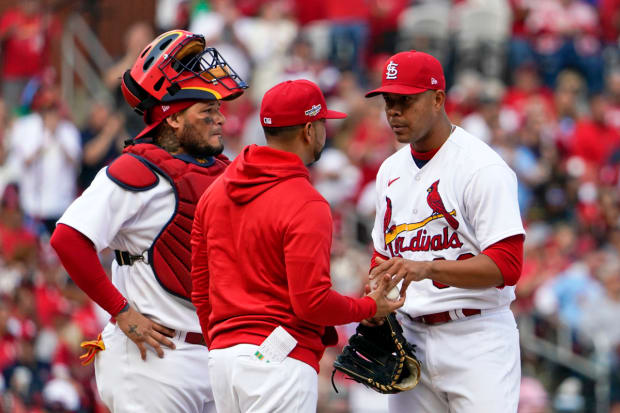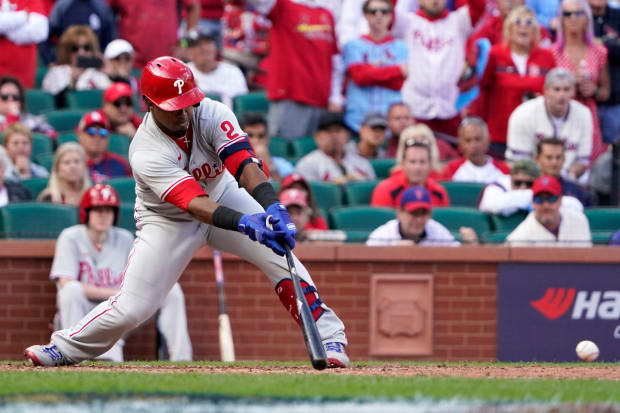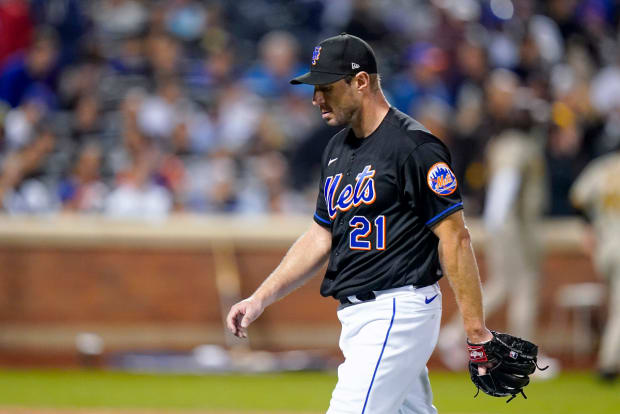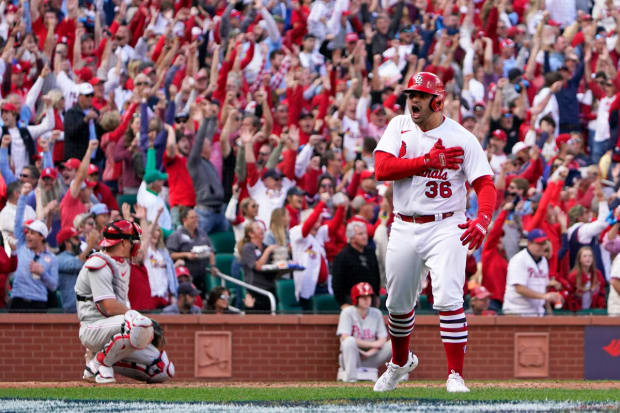The Cardinals absolutely crumbled in the ninth inning yesterday. There’s no other way to explain how they went from up two with two outs to go for a win, to down four and having to bat in the bottom of the ninth. Closer Ryan Helsley, who was called upon to record a five-out save, suddenly lost his command, and their Gold Glove infielders missed plays they almost always make—the worst of which came when Nolan Arenado, the best defensive third baseman I’ve ever seen, whiffed on a routine bouncing ball that should’ve been an inning-ending double play.
The players, though, are not alone in their culpability for the collapse. Manager Oliver Marmol made several questionable decisions that first set into motion and then exacerbated this series of blunders, which ultimately left his team on the brink of elimination.
First, with one out and nobody on in the sixth inning of a scoreless game, Marmol took out his starting pitcher, lefthander José Quintana, who at the time had allowed two hits and one walk and had thrown only 75 pitches.

Jeff Roberson/AP
Going to the bullpen here was not wholly without merit. The next two batters up for the Phillies were Rhys Hoskins and J.T. Realmuto, two right-handed hitters who combined for 52 home runs this season. One home run could make the difference in the game; after all, Philadelphia’s ace Zack Wheeler was dealing and St. Louis batters hadn’t scored a run off him in either of his two previous starts against them. The Cardinals have a strong bullpen with two legitimate closers—Helsley and Giovanny Gallegos—and another, Jordan Hicks, who saved 14 games as their closer in 2019 before he tore his UCL in June and needed Tommy John surgery. That doesn’t even include the three very good Cardinals starting pitchers (Jack Flaherty, Adam Wainwright and Jordan Montgomery) who were available in relief for this short, best-of-three series.
Indeed, plenty of front-office employees across the league would say that going to the ‘pen was the right move. And if this were a random game during the regular season, or even Game 1 of a best-of-five or seven-game playoff series, they probably would be correct. But a best-of-three series such as this one allows for such little room for error. One pitcher being off his game is all it takes to lose a winnable game and lead to an early postseason exit.
And based on what was unfolding on the field, Quintana wasn’t just not off his game. He was quite possibly pitching as well as he had at any point over the last three seasons, during what, it turns out, was his best stretch of his 11-year career. In his seven starts since Sept. 7, including yesterday’s game, Quintana allowed three earned runs over 38 ⅔ innings, good for a 0.70 ERA. In his previous best span of seven starts, he’d allowed seven earned across 47 innings (1.34 ERA) from April 11 to May 14, 2016—back when he pitched for the White Sox.
Yesterday, Quintana was keeping batters off-balanced and mostly avoiding hard contact. Only four times did the Phillies make hard contact (exit velocity of at least 95 mph) against him. Two of them were hard grounders (one an out, one a single) and the other two were fly balls that weren’t in danger of leaving the yard (one an out, one a double down the left-field line). That last part is key, here, because the longball is the only risk Marmol would take in leaving Quintana in to try and get through the sixth. And chances that Quintana would surrender a home run, even against a potent Philadelphia lineup, were slim. Quintana doesn’t give up home runs often, especially not since he was traded to the Cardinals in early August; he allowed just one home run in 12 regular season starts with St. Louis.
At first, Marmol’s quick hook worked out. Hicks swiftly retired Hoskins and Realmuto, and then Gallegos pitched a clean seventh. By the time Gallegos came back out for the eighth, the Cardinals had a 2–0 lead on Juan Yepez’s pinch-hit two-run homer. Gallegos pitched to two batters in the eighth—Jean Segura lined out to left and Bryson Stott walked—before Marmol went to Helsley. This was the skipper’s second mistake. Helsley needed 10 pitches to strike out pinch-hitter Brandon Marsh and get Kyle Schwarber to pop out, so once again, no harm done. But that’s partly why this was such a lapse in managerial judgment. Any good late-inning pitcher should at least have been able to put away Marsh, and the right reliever might have induced an inning-ending double play. The right pitcher would have been ground-ball specialist Andre Pallante (more on him later) to get the double-play ball and get out of the inning before Schwarber even got up. Then, Marmol could have brought in a fresh Helsley to start the ninth against the top of the Philadelphia order.
On top of this, Helsley jammed his finger in his previous outing, on Tuesday, and there was some concern whether or how well he’d be able to pitch. He and the Cardinals both said he was fine, but as the outing wore on, his pitch count climbed and his command disintegrated, it became clear that he had re-aggravated it. After he walked two batters to load the bases with one out in the ninth and plunked Bohm to force home the first Philadelphia run, the trainer came out, examined his finger and decided it best that he come out. Surely, it was at least one batter, probably more like two batters, too late. As Michael Baumann of FanGraphs noted, there were 48 games this season in which Helsley threw between one and 28 pitches; only twice had he either lost or blown a save. In Helsley’s seven appearances in which he threw at least 29 pitches, he had two blown saves and one loss. In this most crucial of games, in which he was going for a five-out save with a jammed finger on his throwing hand, Marmol let him throw 33 pitches.
Long after it had become clear to everybody else watching the game, Marmol realized it was finally time to get a reliever ready and he hastily warmed up both Flaherty and Pallante, and when he finally yanked Helsley, he went with Pallante to face Segura. This, before we continue, was the right call—if in large part because he made the wrong one in not going to Pallante in the eighth—because a double play would’ve won St. Louis the game. Naturally, though, the next decision negated the Pallante move.
Marmol brought in his ground-ball pitcher, hoping to get a double-play ball, and for some reason had his middle infielders play halfway between in and normal depth, which limited the range of those same middle infielders he was relying on to turn that much-needed double play. So, when Pallante induced a double-play ball to the left of second baseman Tommy Edman, who was playing shallower than normal, it squeaked through the hole and into right field to bring home the tying and go-ahead runs. Yes, Edman probably should have made the play, not because it was simple—it wasn’t an easy play—but because he’s Tommy Edman, one of the best defenders in the game. However, it would have been routine had Marmol left his infielders at normal depth.

Jeff Roberson/AP
Marmol defended his team’s positioning on that play after the game. As Emma Baccellieri wrote in her postgame column on the disastrous inning, “Asked if Segura’s hit might have been saved if the infield had been positioned any differently—further back, perhaps—Marmol insisted they were in the right place. His fielders did, too: This was how they said they would have set up for this situation at any point this season.”
The problem with Marmol’s rationale is that this wasn’t any other game and this situation wasn’t the same as any other point this season. The Cardinals were up one run in Game 1 of a best-of-three playoff series, and they brought in a ground-ball pitcher specifically so they could get the game-ending double play. The goal, at that point, shouldn’t have been to cut down the runner on third at the plate trying to score. Instead, the goal should have been to get the double play.
With the infield back, the worst thing that could have happened would have been a fielder’s choice at second base, which would have scored the tying run from third. That wouldn’t have been all that bad. There would have been two outs and, assuming Pallante could have retired Bryson Stott for the final out without letting in the go-ahead run, the heart of the Cardinals order would have come up in the bottom of the ninth against a shaky Philadelphia bullpen. Even if Pallante couldn’t record the third out before allowing a third Phillies run to score, St. Louis still would have avoided the meltdown inning if it had just kept the infield at normal depth.
Now, after losing a game they were in complete control of for the first eight innings, the Cardinals’ season could end as soon as tonight. The players are certainly responsible for what unfolded in the calamitous ninth inning. Their manager deserves his fair share of the blame, too.
Have any questions or comments for our team? Send a note to mlb@si.com.
1. THE OPENER

Frank Franklin II/AP
“After two days of obfuscation, arrogance and general nonsense, the Mets’ players made clear on Friday what Mets manager Buck Showalter refused to say: Jacob deGrom will start Game 2 of the National League wild card series.
“Showalter said on Thursday that the team would decide its Game 2 starter based on the outcome of Game 1. He did not elaborate, but even a casual observer could understand that the idea would be to maximize New York’s one-two punch: Win Game 1 with co-ace Max Scherzer, use No. 3 starter Chris Bassitt to try to sweep the Padres in two games and keep deGrom, the other ace, available to start either a winner-take-all Game 3 or, ideally, Game 1 of the NLDS against the Dodgers.
“Well, all that gamesmanship doesn’t do you much good if the first ace gets knocked out. By the time Scherzer trudged off the mound with two outs in the fifth, seven Padres having crossed home plate, the boos of 41,621 enraged fans providing the soundtrack, the outcome was all but decided. The Padres would win 7–1.”
That’s how Stephanie Apstein begins her column from last night at Citi Field. It’s an excellent look at all the ways in which things went wrong for the Mets.
The Mets Only Have Themselves to Blame for Their Starting Pitching Debacle by Stephanie Apstein
New York tried to get cute with its first three starters. Now, it’s one loss away from a more than promising season ending in heartbreak.
2. ICYMI
Let’s run through some of our other great SI baseball stories from this week.
The Ninth Inning From Hell by Emma Baccellieri
The Cardinals were two outs from a Game 1 win over the Phillies when everything fell apart.
Baseball Players LOVE Their Playoff Merch by Stephanie Apstein
Only slightly less coveted than the postseason berth itself, the highly anticipated playoff paraphernalia is an MLB rite of passage.
AL Wild-Card Series Predictions for Guardians-Rays and Mariners-Blue Jays by SI MLB Staff
Which teams will be moving on to the American League Division Series next week? Our MLB writers make their picks.
NL Wild-Card Series Predictions for Mets-Padres and Cardinals-Phillies by SI MLB Staff
Which teams will be moving on to the National League Division Series next week? Our MLB writers make their picks.
Before deGrom’s start tonight, you can read Stephanie’s excellent feature from earlier this year on the two-time Cy Young winner just as he was returning from 13 months of injuries.
Will Mets Ace Jacob deGrom Get the Last Laugh? by Stephanie Apstein
When he’s not bullying opposing hitters, he’s known to set his sights on his own clubhouse. As he nears a return from injury, the key question is whether he can push around his own body.
3. WORTH NOTING from Stephanie Apstein
Padres first baseman Josh Bell hit a two-run home run against the Mets on Friday in his first career postseason at bat. That seems impressive, and it is: No matter how hard you try to prepare, just about everyone is caught off guard by how different the playoffs are from the regular season. But the feat is not as rare as you might think. Indeed, two other players did it on Friday alone! Catcher Cal Raleigh of the Mariners hit a two-run shot against the Blue Jays and the Cardinals’ Juan Yepez, who entered the game in the seventh as a pinch-hitter, hit a two-run bomb that briefly put St. Louis ahead. Maybe the postseason is easier than we think.

Jeff Roberson/AP
4. W2W4 from Matt Martell
Four games. Four possible clinchers. That was one of the main reasons why MLB expanded the postseason. More teams means more possible elimination games, which means more games with higher stakes, which means more people watching at home, which means more revenue from TV and streaming rights deals. Sound cynical? Well, it is. But it’s also true—and that’s fine with me, because most of us baseball sickos will be watching from noon ET—when the Guardians look to knock out the Rays—until nearly midnight, when the Cardinals-Phillies (first pitch 8:37 p.m. ET) game ends.
The Mets-Padres matchup (7:37 p.m. ET) is the most intriguing of the potential clinchers because it pits Jacob deGrom, who is in the middle of arguably the worst four-game stretch of his career, against San Diego’s Blake Snell, who had a 2.19 ERA in 14 starts since the All-Star break. deGrom has been dealing with a blister on his throwing hand, and while the Mets say it’s no longer bothering him, any reaggravation could really hamper him. At the same time, this is Jacob deGrom, the nastiest pitcher in baseball when he’s right. So long as his blister is gone, there are few pitchers, if any, you would rather have on the mound.
Also, at 4:07 p.m. ET today, the Mariners look to beat the Blue Jays and advance to the ALDS in their first postseason appearance in 21 years. Lefthander Robbie Ray, who won the AL Cy Young last season with Toronto, is on the mound for Seattle against his former team.
5. THE CLOSER from Emma Baccellieri
It’s not surprising that ESPN chose to slot Guardians-Rays as the early game on both Friday and Saturday. (Alas, fun as these teams are, Cleveland and Tampa Bay are not exactly the markets or fanbases that typically garner the big stage.) But the timing was also something of a gift: It meant the entire baseball world briefly had a chance to focus just on this matchup, before any of the others began, which meant a much-deserved spotlight for players like Shane Bieber and José Ramírez and Shane McClanahan. (And Óscar González and his walk-up music!) There’s talent here to thrive in primetime. But if the networks don’t want to put it there, well, here’s a great chance to enjoy it all on its own.


.jpg?w=600)




